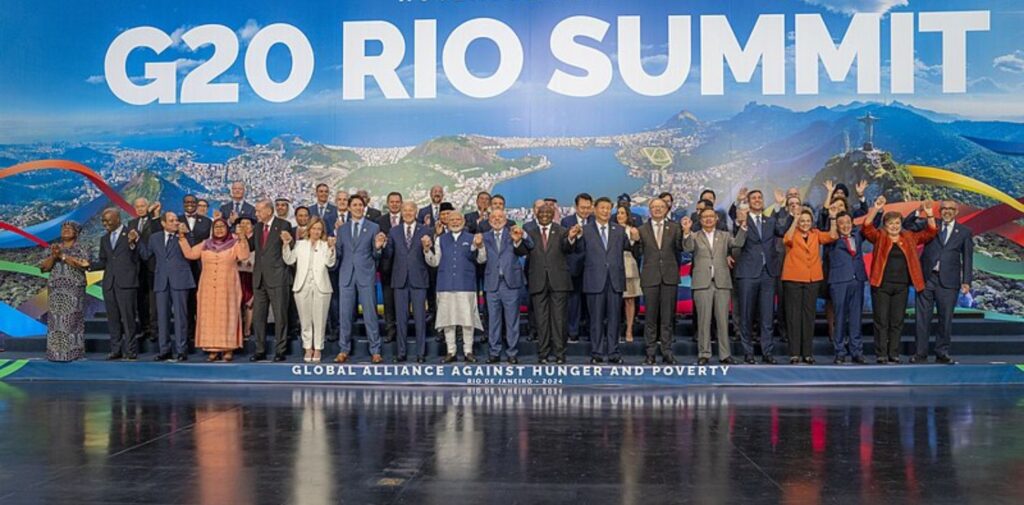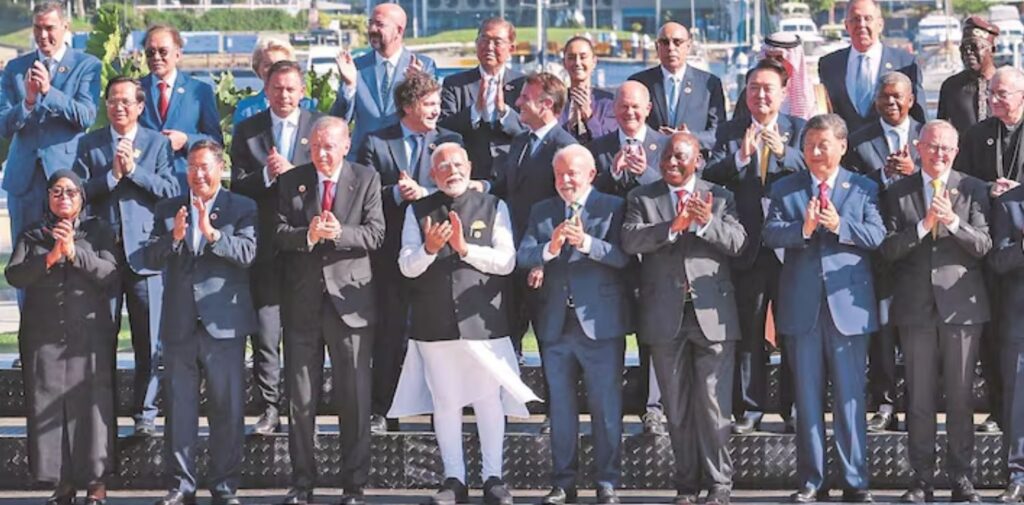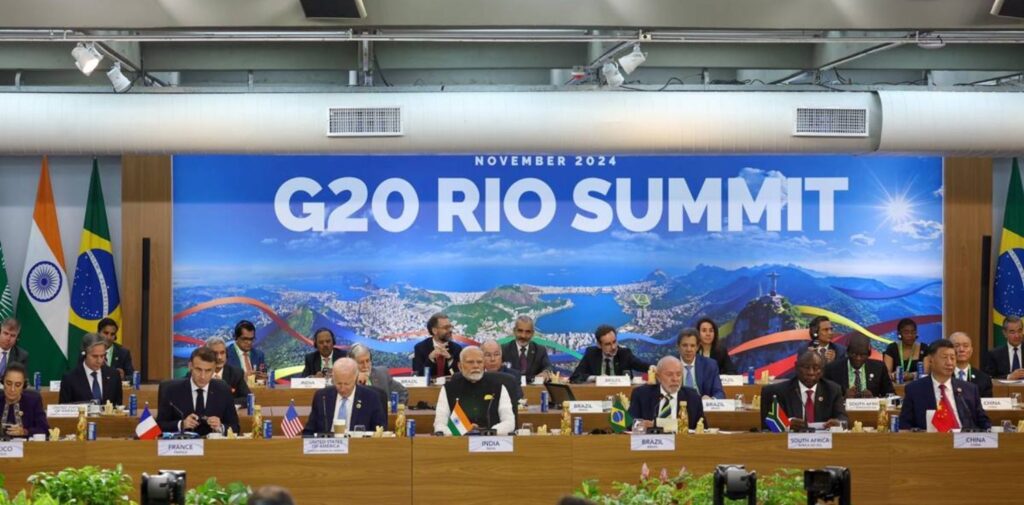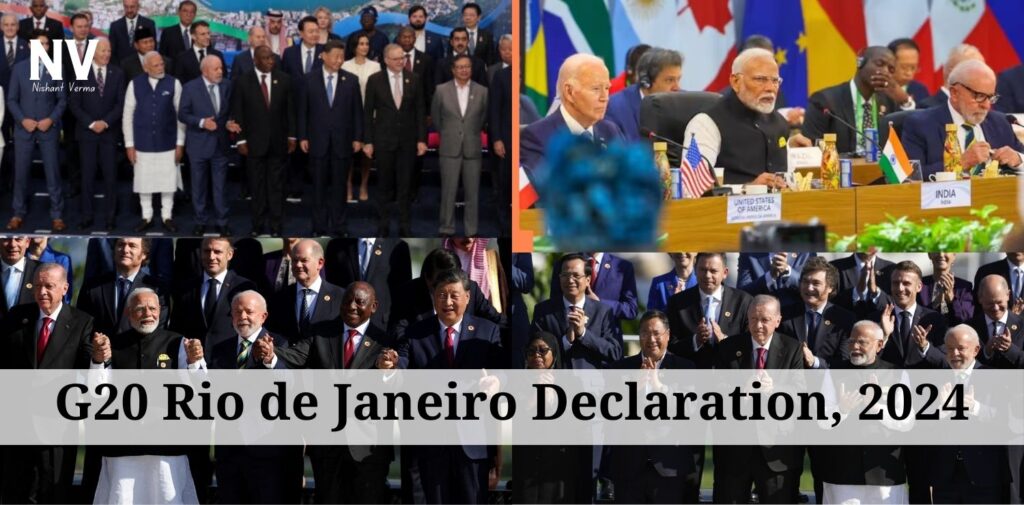The 2024 G20 Summit, held in Rio de Janeiro, concluded with the adoption of the Rio de Janeiro Declaration, a pivotal document reflecting the shared commitment of the G20 countries to address the most urgent global issues. The declaration covers diverse areas such as economic growth, sustainable development, climate change, global trade, and digital transformation, emphasizing international cooperation and inclusivity. Key priorities include enhancing the green energy transition, combating inequality, and ensuring peace in an increasingly complex geopolitical environment. This article explores the significance of these discussions and their potential impact on global governance.
Introduction
The G20 Summit, held annually, is one of the most critical gatherings of the world’s leading economic powers. In 2024, the summit took place in Rio de Janeiro, Brazil, where leaders from the G20 countries deliberated on a range of global issues. As the world continues to recover from the socio-economic impacts of the COVID-19 pandemic, the 2024 summit’s focus was on ensuring a resilient, inclusive, and sustainable future for all. The adoption of the Rio de Janeiro Declaration marked a milestone in global diplomacy, as it set forth an ambitious agenda for addressing climate change, digital inequality, economic instability, and geopolitical risks.

Key Outcomes of the 2024 G20 Summit
- Climate Change and Sustainable Development: A central theme of the summit was the urgent need to address climate change and promote sustainable development. World leaders reiterated their commitment to the Paris Agreement, emphasizing the need to limit global warming to 1.5°C above pre-industrial levels. The declaration highlighted the importance of transitioning to green energy, reducing carbon emissions, and investing in climate adaptation strategies. Key initiatives included increasing financial support for developing nations, especially those most vulnerable to climate impacts, to ensure a just transition to sustainable economies.
- Economic Growth and Global Trade: Economic recovery was a priority, with leaders acknowledging that the pandemic had significantly disrupted global trade and economies. The summit called for the enhancement of global supply chains, the reduction of trade barriers, and the promotion of free and fair trade. The declaration stressed the importance of diversifying economies, reducing dependency on single sectors, and creating resilient economic systems capable of weathering future shocks. Ensuring equitable growth was also emphasized, particularly in addressing the disparities between developed and developing nations.
- Digital Transformation and Technology: In the digital age, technology has become a cornerstone of economic growth and development. The G20 leaders focused on how digital transformation could drive sustainable economic development while addressing challenges such as the digital divide. The summit recognized the need for global cooperation in advancing digital infrastructure, enhancing cybersecurity, and ensuring equitable access to technology. Digital literacy and inclusivity were also central to discussions, aiming to close the gap between technologically advanced nations and those still grappling with digital inequities.
- Geopolitical Tensions and Security: Geopolitical tensions, particularly in regions like the Indo-Pacificand Eastern Europe, were also on the summit’s agenda. The leaders called for greater diplomatic efforts to prevent conflicts and enhance global peace and security. The declaration underscored the importance of multilateralism and the need for a collaborative approach to global security challenges, including cybersecurity and the proliferation of weapons of mass destruction. Leaders expressed support for peaceful conflict resolution and the role of international organizations like the United Nations in fostering global stability.

The Rio de Janeiro Declaration
The Rio de Janeiro Declaration emerged as the key document of the summit, encapsulating the collective stance of the G20 countries on global issues. The declaration emphasized principles such as sustainable development, equality, inclusivity, and resilience in the face of global challenges.
Core Principles and Objectives
The core principles of the declaration include:
- Sustainability: Ensuring that economic growth does not come at the expense of the environment, with a focus on green technologies and sustainable industries.
- Inclusivity: Addressing inequality by promoting equitable access to resources, education, and technology, particularly for vulnerable communities and developing countries.
- Cooperation: Strengthening international partnerships to tackle global challenges, from health crises to climate change, through collaborative efforts.
Action Plans and Commitments
The G20 leaders committed to several specific actions, such as:
- Allocating substantial funds to combat climate change, including investments in renewable energy and sustainable agriculture.
- Supporting the global digital economy by providing infrastructure and fostering innovation, particularly in developing countries.
- Reforming international trade systems to ensure they are fairer and more inclusive, thus benefiting both rich and poor nations.

Global Reactions and Implications
The Rio de Janeiro Declaration has been met with a mixed response. While many have applauded the G20’s renewed commitment to addressing global challenges, critics have pointed out the lack of specific timelines and concrete measures to ensure that these commitments are met. Developing nations, in particular, are keen to see actionable outcomes from the promises made, especially in terms of climate financing and economic support. The declaration has been hailed as a positive step, but the real test will be in its implementation.
On the other hand, some international observers are hopeful that the G20’s unified approach can create a ripple effect, encouraging other global forums to adopt similar measures. The adoption of the Rio Declaration is expected to pave the way for a more coordinated global response to challenges such as inequality, climate change, and economic instability.
Conclusion
The 2024 G20 Summit and the subsequent adoption of the Rio de Janeiro Declaration mark an important moment in global diplomacy. The world’s largest economies have reaffirmed their commitment to working together to address the most critical issues facing humanity. From climate change to digital transformation and geopolitical security, the summit’s outcomes reflect the G20’s role as a central platform for global cooperation. However, for the summit’s goals to be realized, concrete actions and sustained efforts from all nations are necessary. The coming years will reveal how effectively the promises made at the Rio Summit are translated into tangible progress on the ground.




